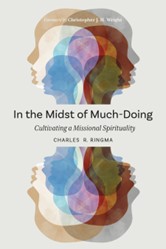In the Midst of Much-Doing: Cultivating a Missional Spirituality
by Charles Ringma tssf
Published by Langham Global [Due mid 2023]
Reviewed by Archbishop Mark Coleridge
Some time ago Charles Ringma gave me a book he had co-edited, Of Martyrs, Monks and Mystics: A Yearly Meditational Reader of Ancient Spiritual Wisdom. I was impressed by the range of sources it brought together and intrigued that Ringma, from a Dutch Reformed background, was so drawn to and familiar with voices from very different traditions; and I now use the book each day in my prayer. The same breadth and depth of engagement is even more evident in this longer and more systematic work, In the Midst of Much-Doing: Cultivating a Missional Spirituality.
Charles Ringma says that this is no work of academic theology, and in a sense that’s true. Yet it draws upon a wide range of theological voices of many backgrounds, and that gives the book an intellectual solidity. However, it is more invitational than instructional, more exploratory that expository. Above all, it is a work born of personal struggle through a now long life, which gives the book something of the feel of spiritual autobiography, weaving together many threads of a life that has been not only long but remarkably varied.
Charles Ringma’s voice is distinctive, and yet what he offers here is polyphonic. Many voices old and new, contemporary and traditional, are drawn together in an unusual harmony. It is a work described as trialectical: head, heart and hand dance together, as do theology, spirituality and mission, orthodoxy, orthopathy and orthopraxy. It is a work that moves inward, upward and outward; and all of this looks to the Trinity which is the womb of spirituality and mission and the point where they perfectly converge.
Not surprisingly, the inspiration of this book is radically biblical; but it also stresses the need to listen to and learn from the voices of the poor, often heard on the peripheries. Listening to the voice of God in Scripture and the voice of God in the poor becomes the ground of the contemplative vision which the book builds. Words like contemplation, mysticism and spirituality can be slippery. But Charles Ringma makes it clear that they all look to the experience of the real God which the world craves. People, especially the young, are looking not for words or concepts about God but for the experience of God; and unless Christians have this experience in depth they will leave the world dying of hunger. The Church can go out to the world only if the Church goes down into God.
Listening to God, experiencing God, leads to a new way of seeing the world – a new vision which genuinely pays attention as only the contemplative can. This is the truly prophetic vision of which this book speaks. The prophet in Scripture is one who has heard the word of God or seen a vision of God and who speaks of what is heard or seen to a world which may not welcome the word spoken. To hear this word, to see this vision, and to speak of what we have heard will demand not only discipline, even an asceticism, but also a willingness to enter into the mystery of the Lord’s Cross at the heart of which is love.
Charles Ringma, then, takes Christian mission far beyond managerialism, rooting it in the mission of the God who is love. The Church doesn’t work for God but with God. Mission for the Church is not just one task among many but a way of life. The Church doesn’t just have a mission but is a mission. The Church doesn’t exist for its own sake but for the sake of the world which “God so loved…that he sent his only begotten Son” (John 3:16).
These are life-giving insights at a time when a Church under pressure may be tempted to close ranks in a form of self-defence but when the Church in fact has to imagine and enact new forms of mission. At such a time, the Church’s great mistake would be a kind of introversion which may look like self-defence but would be self-destruction. In this book, Charles Ringma not only warns against that but, humbly and wisely, points the true way ahead.
************************
Archbishop Mark Coleridge was ordained as priest in 1974. He holds a doctorate in Sacred Scripture from the Pontifical Biblical Institute, and was Master of the Catholic Theological College in Melbourne. He has served on the Vatican Secretariate of State, the Pontifical Council of Culture, and the Pontifical Council of Social Communications. Since 2012, he has served as the Metropolitan Archbishop of Brisbane, Australia.
…………………………………………………………………………………………………………

